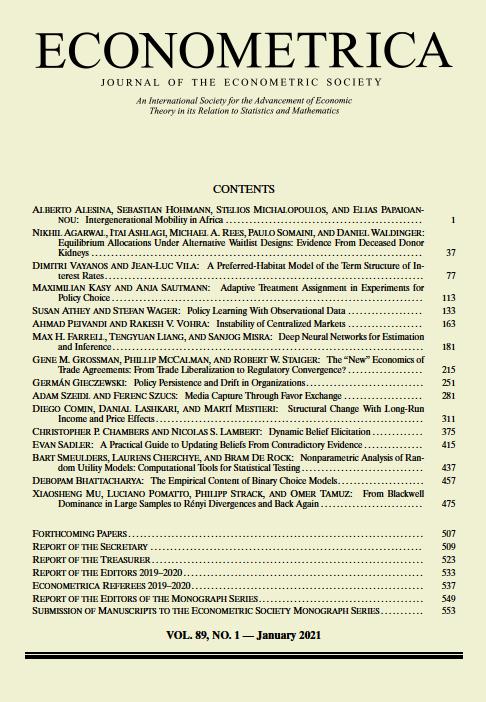变化环境中的静态社会学习
IF 7.1
1区 经济学
Q1 ECONOMICS
引用次数: 0
摘要
我们考虑的是不断变化的世界中的社会学习。在状态不断变化的情况下,只有当行为主体定期根据新信息采取行动时,社会才能做出反应,这就大大限制了观察学习的价值。当状态接近持久时,通常会出现一种共识,即大多数代理选择相同的行动。然而,共识行动与状态并不完全相关,因为社会在状态变化后会表现出惰性。当信号足够精确时,即使行为主体抽取了大量过去行动的样本,学习也是不完全的,因为这样一来,样本内的行动就会变得过于相关,从而降低了信息量和福利。本文章由计算机程序翻译,如有差异,请以英文原文为准。
Stationary Social Learning in a Changing Environment
We consider social learning in a changing world. With changing states, societies can be responsive only if agents regularly act upon fresh information, which significantly limits the value of observational learning. When the state is close to persistent, a consensus whereby most agents choose the same action typically emerges. However, the consensus action is not perfectly correlated with the state, because societies exhibit inertia following state changes. When signals are precise enough, learning is incomplete, even if agents draw large samples of past actions, as actions then become too correlated within samples, thereby reducing informativeness and welfare.
求助全文
通过发布文献求助,成功后即可免费获取论文全文。
去求助
来源期刊

Econometrica
社会科学-数学跨学科应用
CiteScore
11.00
自引率
3.30%
发文量
75
审稿时长
6-12 weeks
期刊介绍:
Econometrica publishes original articles in all branches of economics - theoretical and empirical, abstract and applied, providing wide-ranging coverage across the subject area. It promotes studies that aim at the unification of the theoretical-quantitative and the empirical-quantitative approach to economic problems and that are penetrated by constructive and rigorous thinking. It explores a unique range of topics each year - from the frontier of theoretical developments in many new and important areas, to research on current and applied economic problems, to methodologically innovative, theoretical and applied studies in econometrics.
Econometrica maintains a long tradition that submitted articles are refereed carefully and that detailed and thoughtful referee reports are provided to the author as an aid to scientific research, thus ensuring the high calibre of papers found in Econometrica. An international board of editors, together with the referees it has selected, has succeeded in substantially reducing editorial turnaround time, thereby encouraging submissions of the highest quality.
We strongly encourage recent Ph. D. graduates to submit their work to Econometrica. Our policy is to take into account the fact that recent graduates are less experienced in the process of writing and submitting papers.
 求助内容:
求助内容: 应助结果提醒方式:
应助结果提醒方式:


